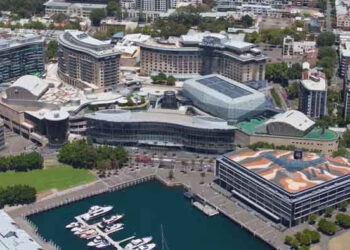Macau Legend Development Ltd, owner and operator of Legend Palace and the Macau Fisherman’s Wharf precinct, revealed in its results announcement for the year ended 31 December 2024 that it was in default of a loan principal instalment and at the mercy of its lenders as it looks to stay afloat.
Outlining multiple uncertainties relating to going concern, the company explained that its outstanding bank borrowings of HK$2.07 billion (US$258.3 million) would become immediately payable if demanded by its creditor banks due to non-compliance of certain loan covenants. Of these borrowings, a loan repayment of HK$132.0 million (US$16.5 million) has been in default as of 31 December 2024 according to the original loan repayment schedule.
Macau Legend added that its net current liabilities stand at HK$2.51 billion (US$313.8 million) while its cash and bank balances amounted to just HK$52.3 million (US$6.5 million) at the end of FY24.
The company’s financial woes are only getting worse, with Macau Legend reporting Friday another HK$622.6 million (US$77.8 million) loss in 2024, despite group-wide revenue rising by 4.3% year-on-year to HK$771.5 million (US$96.4 million) and Adjusted EBITDA by 65.2% to HK$159.8 million (US$20.0 million). The improvement primarily came from a 17.1% increase in gaming revenue from the provision of casino management services at Legend Palace – slightly offset by a decline in non-gaming revenue.
In its filing, Macau Legend said the significantly widened loss in FY24, up from a loss of HK$4.9 million (US$612,500 million) in FY23, was “mainly due to the impairment losses of approximately HK$376.2 million (US$47.0 million) recognized in relation to the non-financial assets held by the group’s investment projects in Macau and Cape Verde in the current year, as well as the write back of a provision for Macau complementary tax of HK$415.5 million (US$51.9 million) in the last corresponding year.”
In relation to its ability to continue as a going concern, Macau Legend explained that it has undertaken measures to improve the group’s liquidity and financial position, including a restructuring of outstanding loan repayments and the seeking of support from its lenders in not pursuing immediate payment of debts.
“Should the Group fail to achieve the above-mentioned plans and measures, it might not be able to continue to operate as a going concern and adjustments would have to be made to write down the carrying values of the group’s assets to their recoverable amounts, to provide for any further liabilities which might arise, and to reclassify non-current assets and non-current liabilities to current assets and current liabilities,” it said.






























